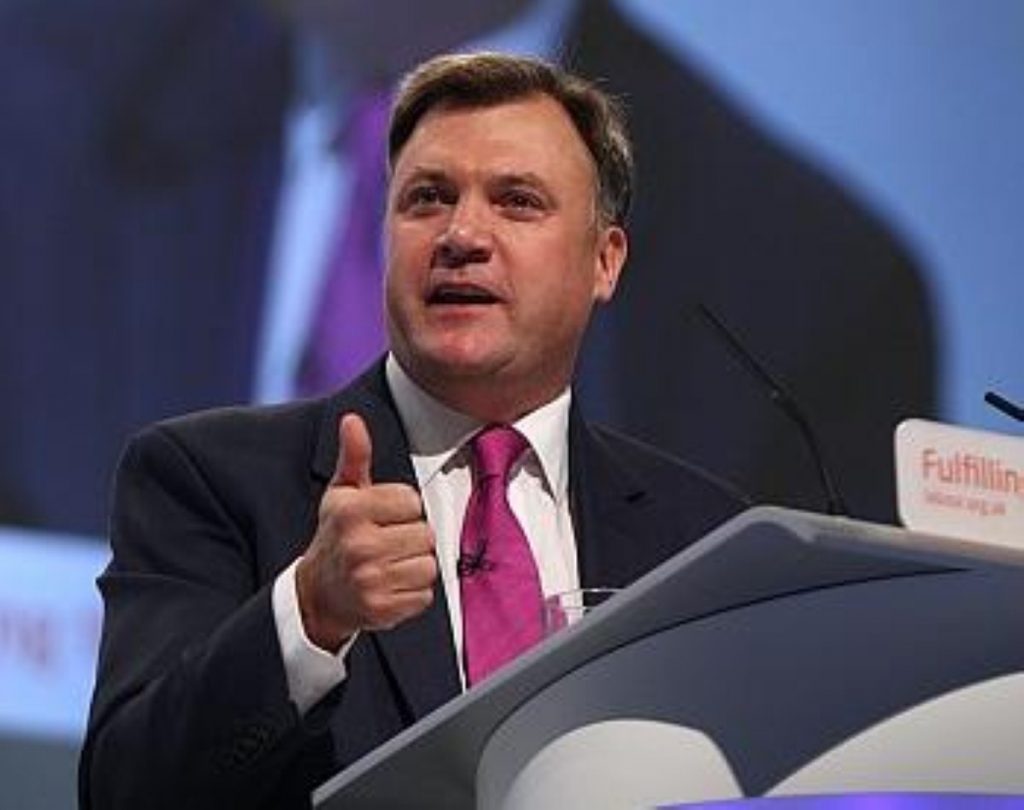The new rules: Balls spearheads Labour revival
By Ian Dunt Follow @IanDunt
Ed Balls has launched Labour's bid to get voters to trust the party with the economy again by pledging "iron discipline" on tough economic decisions.
Delivering his conference speech in Liverpool, the shadow chancellor promised to bind a future Labour government to strict spending rules and use the windfall from bank shares to reduce the national debt.
He said he could not make promises to reverse particular spending cuts or tax rises – and warned that any future government would still face "difficult decisions and tough choices in the years ahead".


"Before the next election – and based on the circumstances we face – we will set out for our manifesto tough fiscal rules that the next Labour government will have to stick to," the shadow chancellor told delegates.
"These fiscal rules will be independently monitored by the Office for Budget Responsibility.
"We know that, even as bank shares are falling again, David Cameron and Nick Clegg are still betting on a windfall gain from privatising RBS [Royal Bank of Sctoland] and Lloyds to pay for a pre-election giveaway.
"We could also pledge to spend that windfall.
"But – just as with the 3G mobile phone auction – we will commit instead in our manifesto to do the responsible thing and use any windfall gain from the sale of bank shares to repay the national debt. That will be Labour's choice – fiscal responsibility in the national interest."
While Labour leads the Conservatives in general, consistent polling results show the public does not trust the party to handle the economy.
Today's speech indicated Labour is beginning its attempt to reverse that trend. Mr Balls said a future Labour government had to be guided by "iron discipline".
He risked anger in the conference hall by speaking out against November's planned public sector pensions strike, saying Labour would have had to raise pension contributions and the retirement age.
"While we know that the government's approach to pensions has been confrontational and unfair, we do know too that there are difficult decisions on pensions which we cannot duck," he said, to silence from the conference hall.
"There is nothing George Osborne would like better than a strike this autumn to divert attention away from his failing economic plan."
The shadow chancellor had earlier attracted applause by attacking the Conservatives, arguing that the coalition's economic strategy had gone "badly wrong".
"We said that going too far, too fast would choke off the recovery and put jobs at risk; we warned that cutting spending and raising taxes too fast would create a vicious circle here in Britain and make it harder to get the deficit down," he added.
"This is not – as the Conservatives claim – simply a crisis of public debt which can be solved – country by country – by austerity, cuts and retrenchment – but truly a global growth crisis which is deepening and becoming more dangerous by the day."
The shadow chancellor maintained his argument for halving the deficit in four years and admitted Labour would not reverse all the coalition's spending cuts in power.
"A more balanced, medium-term plan to get the deficit down will still mean tough choices in the years ahead," he said.
"Tough choices on tax and spending – like the cuts to welfare, education and Home Office budgets. Discipline in public and private sector pay."
He called on the government to implement a temporary cut in VAT, repeat the bank bonus tax this year, give a one-year national insurance tax break for all small firms which take on extra workers.
Mr Balls also advocated a one-year cut in VAT to just five per cent for home improvements, repairs and maintenance.









